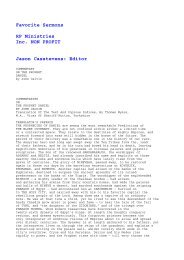Lamentations - The Sermon Depository
Lamentations - The Sermon Depository
Lamentations - The Sermon Depository
Create successful ePaper yourself
Turn your PDF publications into a flip-book with our unique Google optimized e-Paper software.
they had dared to set up these impostors against Jeremiah as well as other<br />
servants of God; for they had boasted greatly of these their false prophets<br />
whenever they sought to exult against God. How great was this<br />
presumption! When the false prophets had promised them security, they<br />
immediately triumphed in an insolent manner over Jeremiah, as though<br />
they were victorious. As, then, their wickedness and arrogance had been<br />
such against God, the Prophet justly retorts upon them, “Behold now as<br />
to your false prophets; for when they lately promised to you prosperity<br />
of every kind, I was inhumanly treated, and my calling was disdainfully<br />
repudiated by you; let now your false prophets come forward: be wise at<br />
length through your evils, and acknowledge what it is to have acted so<br />
haughtily against God and against his servants.” We now understand why<br />
the Prophet says, “<strong>The</strong>y have seen for you vanity and insipidity.”<br />
He adds, they have not opened, or revealed, &c. <strong>The</strong> preposition l[, ol, is<br />
here redundant; the words are, “they have not revealed upon thine<br />
iniquity.” <strong>The</strong>re is, indeed, a suitableness in the words in that language,<br />
that they had not applied their revelations to the iniquities of the people,<br />
for they would have been thus restored to the right way, and would have<br />
thus obviated the vengeance of God.<br />
Now, this passage ought to be carefully noticed: Jeremiah spoke of the<br />
fallacies of the false prophets, which he said were insipid: he now<br />
expresses how they had deceived the people, even because they disclosed<br />
not their iniquities. Let us then know that there is nothing more necessary<br />
than to be warned, that being conscious of our iniquities we may repent.<br />
And this was the chief benefit to be derived from the teaching of the<br />
prophets. For the other part, the foretelling of future things would have<br />
had but little effect had not the prophets preached respecting the<br />
vengeance of God, — had they not exhorted the people to repentance, —<br />
had they not bidden them by faith to embrace the mercy of God. <strong>The</strong>n<br />
Jeremiah in a manner detects the false doctrines of those who had<br />
corrupted the prophetic doctrine, by saying that they had not disclosed<br />
iniquities. Let us then learn by this mark how to distinguish between the<br />
faithful servants of God and impostors. For the Lord by his word<br />
summons us before his tribunal, and would have our iniquities discovered,<br />
that we may loathe ourselves, and thus open an entrance for mercy. But<br />
when what is brought before us only tickles our ears and feeds our<br />
curiosity, and, at the same time, buries all our iniquities, let us then know<br />
that the refined things which vastly please men are insipid and useless.<br />
Let, then, the doctrine of repentance be approved by us, the doctrine<br />
which leads us to God’s tribunal, so that being cast down in ourselves we<br />
may flee to his mercy.<br />
He afterwards adds, that they might turn back thy captivity; some prefer,<br />
“thy defection” — and this meaning is :not unsuitable; but the Prophet, I<br />
have no doubt, refers to punishment rather than to a crime. <strong>The</strong>n the<br />
captivity of the people would have been reversed had the people in time<br />
repented; for we obviate God’s wrath by repentance: “If we judge<br />
ourselves,” says Paul, “we shall not be judged.” (1 Corinthians<br />
11:31.) As, then, miserable men anticipate God’s judgment when they<br />
become judges of themselves, the Prophet does not without reason say<br />
that the false prophets had not disclosed their iniquities, so that they<br />
might remain quiet in their own country, and never be driven into exile.<br />
How so? for God would have been thus pacified, that is, had the people<br />
willingly turned to him, as it is said in Isaiah,<br />
“And be converted, and I should heal them.” (Isaiah 6:10.)<br />
Conversion, then, is said there to lead to healing; for as fire when fuel is<br />
withdrawn is extinguished, so also when we cease to sin fuel is not<br />
supplied to God’s wrath. We now, then, perceive the meaning of the<br />
Prophet; he, in short, intimates that people had been destroyed because<br />
they sought falsehoods, while the false prophets vainly flattered them; for<br />
they would have in due time escaped so great evils, had the prophets<br />
boldly exhorted the people to repentance. F41<br />
He then adds, And they saw for thee prophecies of vanity and expulsions.



